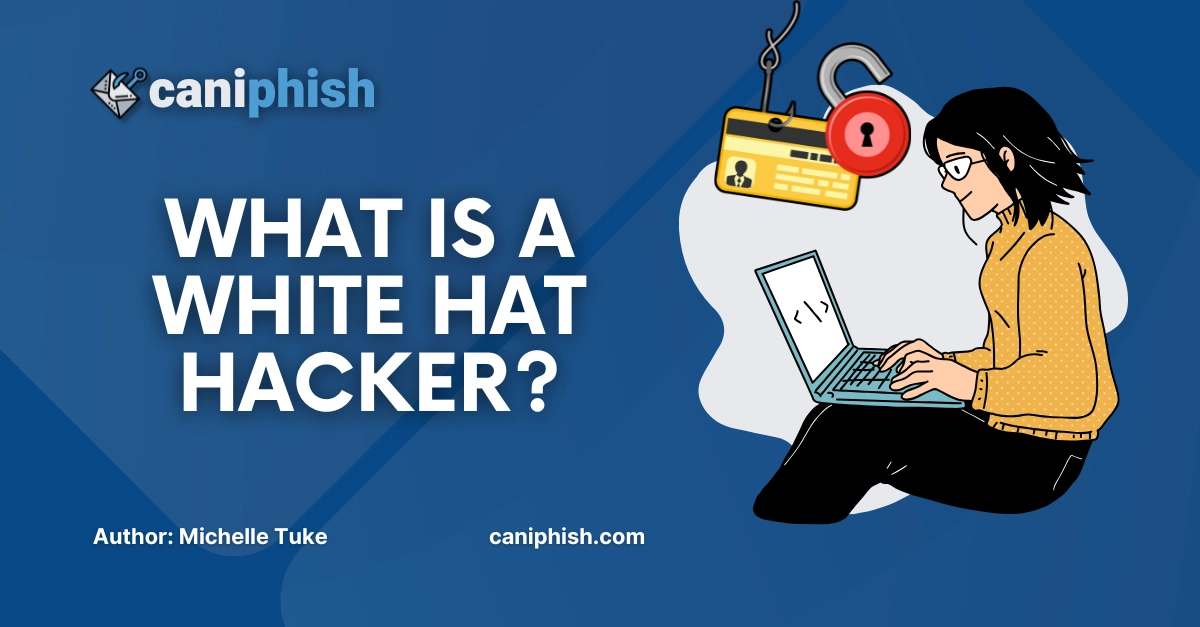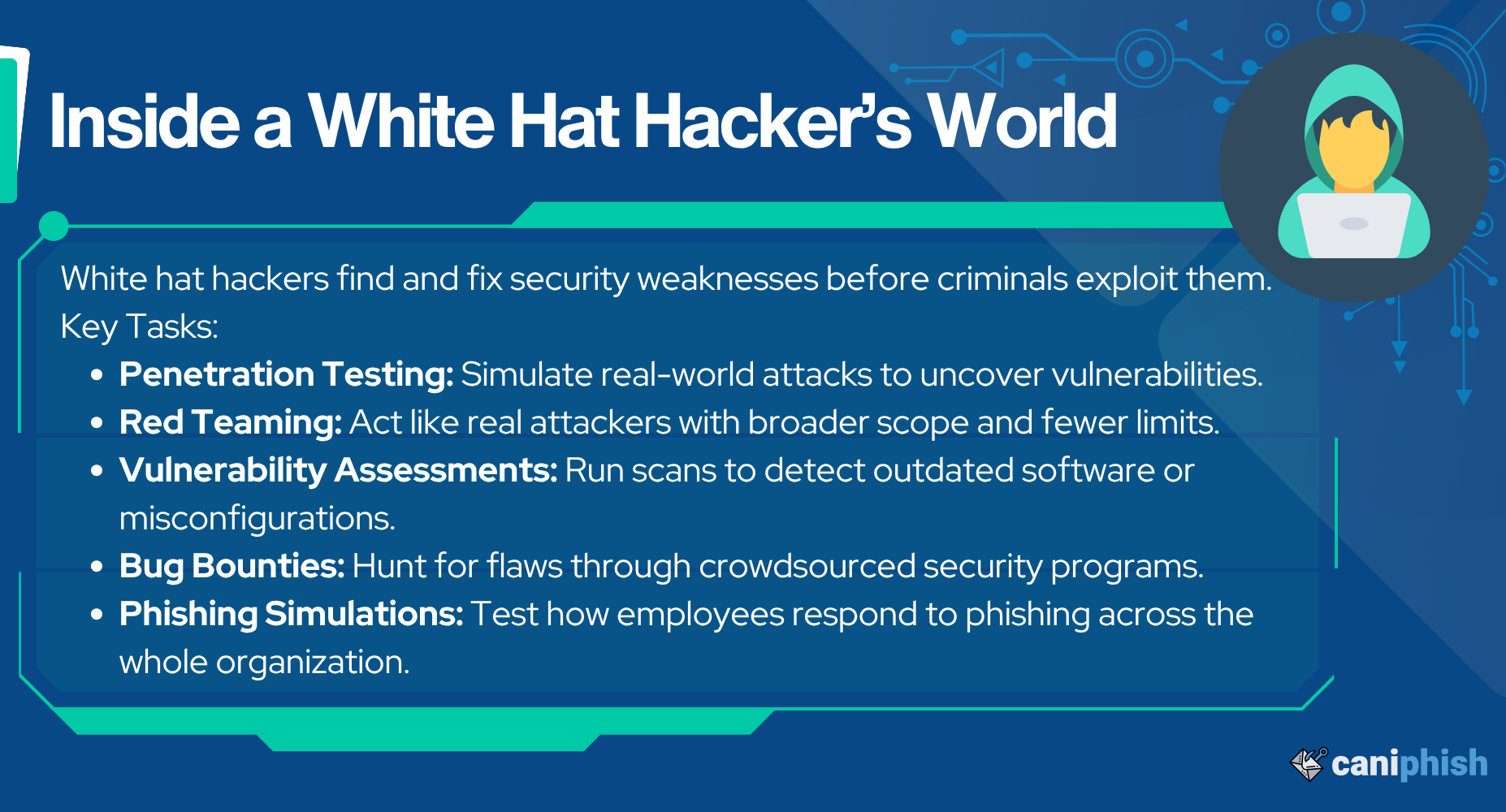What Is A White Hat Hacker?

A white hat hacker is a cybersecurity term for an individual who is authorized to hack into systems to identify and fix security vulnerabilities before malicious attackers can exploit them. Organizations hire white hat hackers, either internally or as external consultants.
What Do White Hat Hackers Do?
The role of a white hat hacker is to think like an attacker and act like a defender. Their job is to identify weaknesses in systems, that could give hackers unauthorized access. Here's what a white hat hacker might typically do;
- Penetration Testing: This is a formal engagement that simulates real-world attacks on people, processes, and technologies within organizations to find vulnerabilities.
- Red Teaming: This is similar to penetration testing, but the gloves come off. Penetration tests are often limited in scope and might only focus on a single system or process. Red team engagements replicate real-world attackers as closely as possible, and have a much broader scope in terms of what they’re allowed to do.
- Vulnerability Assessments: Mostly automated scans of networks, applications, and systems that look for common vulnerabilities, such as outdated software, misconfigurations, or exposed ports.
- Bug Bounty Hunting: Bug bounties are a form of crowdsourced penetration testing, where instead of engaging a single individual or company for a penetration test, organizations engage an entire community of white hat hackers.
- Phishing Simulations: White hat hackers will often assist in phishing simulations. A notable difference between a phishing simulation and a penetration test, is that with phishing simulations, white hat hackers will test the entire organization, instead of targeting an unlucky few.

Do White Hat Hackers Need A Formal Education?
In short, no. Some of the best hackers are self-taught. You don't need a degree or qualifications to be a white hat hacker if you have the skills. That said, having certificates gives you a better chance of being taken seriously in the job market and can improve your chances of getting hired.
Here are some of the most respected and recognized certifications:
Offensive Security Certified Professional (OSCP)
Run by Offensive Security, this certificate involves passing a 24-hour practical exam where you need to hack a variety of machines.
GIAC Penetration Tester (GPEN)
This tests your ability to conduct real-world penetration tests. It covers everything from recon to exploitation, with a strong focus on methodology and best practices.
CompTIA Security+
This is a foundational certification covering the core cybersecurity concepts like incident response, network security and risk management.
CompTIA PenTest+
Focuses on penetration testing where the you’ll be tested on scanning, exploiting, reporting, and managing vulnerabilities across various platforms.
White Hat Vs Black Hat Hackers
White hat hackers are the good guys, and black hat hackers the bad guys in the cyber world. Black hat hackers use their knowledge to cause harm. They operate without permission, break the law, and ignore ethical standards to commit cybercrime, launch attacks, or exploit others for personal gain.
For example: Imagine a major bank releases a new mobile app, but unknown to them, there’s a security flaw in the login process.
A white hat hacker discovers the flaw during a routine, authorized bug bounty program. They submit a report and help the bank fix it before to a real attack happens.
A black hat hacker finds the same flaw, accesses the system without authorization, bypasses the login process, and quietly drains user accounts. The stolen data is then sold on the dark web for profit or used in targeted attacks.
How Do I Become A White Hat Hacker?
Anyone can become a white hat hacker. However, you need to understand how systems work, how attackers think, and how to approach hacking ethically and responsibly. White hat hackers come from all different backgrounds. Some just have a personal interest and are self-taught, some are from IT in companies, some are coders, and some are even black hat hackers.
Step Into The Mind Of A Hacker
The Social Engineer is a high-stakes, turn-based cyber game where you play as an up-and-coming criminal mastermind.
Play now!Frequently Asked Questions
Why Are They Called “White Hat” Hackers?
The term "white hat hacker" comes straight from old western movies, where costume colors were used as a visual cue for audiences to tell the good guys from the bad. The heroes wore white hats, while the villains wore black. The white hats played by the rules, while the black hats broke the law and caused trouble, just like in the world of hacking today.
Do White Hat Hackers Get Paid?
Yes, and the ones who have a high skill level, a good repulation get well paid. And rightly so.
Whether salaried, freelance, or bounty hunting, there's a strong demand for legal hackers who can outsmart the bad guys before it's too late. In the US, white hat hackers get paid anywhere between $90,000–$150,000+ per year. The senior positions in high-demand sectors like defense or financial get paid well over $200,000 per year.
With the bug bounty programs, payouts range from $100 for low-risk bugs to $30,000+ for critical ones.In rare, high-stakes cases, like with Google, Apple, or Meta, rewards can exceed $100,000.
Is Ethical Hacking The Same As White Hat Hacking?
Yes! White hat hacking is often referred to as "ethical hacking." Ethical hacking is an act; white hat hacking is the role, but they are essentially the same thing.
Can White Hat Hackers Be Part Of A Cybersecurity Team?
White hat hackers require a wide range of skills so teaming up with security with analysts, engineers, and threat hunters makes it easier (and faster) to find and fix vulnerabilities before the bad guys do. These individuals have skills ranging from network analysis and coding to social engineering and malware reverse-engineering. Some freelancers work alone. Some prefer having the option to choose what they do and work at their own pace, earning a living through platforms like HackerOne or direct client work. Whether working in a team or flying solo, the mission stays the same: strengthening security systems, with permission to do it correctly.
Can White Hats Accidentally Break the Law?
White hat hackers can break the law if they do anything without permission. There’s a fine line between acting within the law and crossing it. That’s why they always operate with clear, written permission. Everything is in black and white, because the moment you access, test, or exploit something you’re not authorized to, you’ve stepped into gray or even black hat territory.
Can A White Hat Go Black Hat?
Absolutely! Max Butler (aka Iceman) is a well-known white hat hacker who went rogue. From the late 1990s to the early 2000s, he worked for the FBI as a security researcher and collaborator (not as an official employee). While working for the FBI, he was running his own secret side project, hacking systems he was hired to protect and planted backdoor entry points for future access. He stole credit card data and sold it on underground forums for millions. He was arrested in 2007 and served 13 years behind bars. This is the perfect example of how a white hat hacker can switch sides and go black hat.
